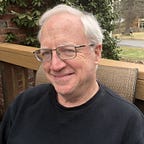Hank Aaron: Consistent & Courageous
I was more of a Willie Mays guy because of the exuberance and style. The fluid and beautiful Roberto Clemente was my favorite right fielder. But man, Hank Aaron. Hammerin’ Hank of the Braves was the model of consistent excellence like the guy or gal in your workplace who just does everything at a super high level and is that good every day. You can easily come to take them for granted. Hank knew that and he wasn’t always happy about it. If he had played in an east coast city or in LA or San Francisco he would have been better appreciated. Milwaukee in the 1950’s wasn’t a very hip place or a major media market.
He won the MVP and a World Series ring at age 23 and played another twenty years without any additions — though he finished third in MVP voting six times. I got to see him just once, game 4 of the ’58 series in Yankee Stadium. Warren Spahn threw a three-hit complete game (of course) shutout (3–0). Aaron had a double and single.
Mays and Mantle got more hype, but Mickey knew the score: “As far as I’m concerned, Aaron is the best ballplayer of my era. He is to baseball of the last 15 years what Joe Dimaggio was before him. He’s never received the credit he’s due.”
Like Mays, Aaron was born in Alabama in the early ’30s. Poor and super-talented. At 18 he helped lead the Indianapolis Clowns to the Negro League World Series title. He made it to the majors at age 20 as the only black player on the Braves. Jackie Robinson had led the way but there still was tremendous racism in baseball through all of Aaron’s career.
Consistency and resilience. Aaron would break Ruth’s record without ever hitting more than 47 homers in a season. He JUST averaged 37 HR/season over the 19 years of his prime. You can’t do that unless you’re a gamer — someone who goes out there even when hurt, someone who isn’t nursing a hangover during a day game. And he was a right-fielder, a great one, not a DH.
Courage. Hank approached 714 still as a Brave but now in Atlanta, the pre-renaissance Atlanta before the first black mayor. All through the ’73 season (which he ended with 713 homers), he received a tremendous amount of hate mail and death threats. Here’s a sample:
“I hope you don’t break the Babe’s record. How do I tell me kids that a [slur] did it.” This note was signed: “KKK (Forever).”
“You are not going to break his record established by the great Babe Ruth if I can help it,” read another. “Whites are far more superior than [slur] . . . My gun is watching your every black move.”
All alone in right field. An armed bodyguard was assigned but who could get to right field if someone in the bleachers charged? Or shot? We watched with real fear.
Aaron knocked #714 on opening day of 1974 in Cincinnati. He sat out the next two games to wait ’til the Braves were back in Atlanta to break it. First game back — April 8, 1974. Gone.
“Braves” may be cultural appropriation but Henry Aaron deserved the appellation. Like Robinson, his childhood hero, he was also a man of enormous restraint and dignity.
After retirement, he took an upper management position with the Braves and then with Turner Broadcasting, the network that broadcast their games. He also owned and operated several car dealerships in the Atlanta area.
As much as any area of American life, sports has been the arena where the excellence of people of color has challenged the self-serving prejudices of white people. As much as the excellence, the character of men like Hank Aaron has helped transform U.S. culture and politics. Because they understood this, Bill Clinton awarded Aaron the Presidential Citizens Medal and George W. Bush, a part owner of the Texas Rangers, awarded him the Presidential Medal of Freedom.
Last word to the POTUS (from his statement today):
“With courage and dignity, he eclipsed the most hallowed record in sports while absorbing vengeance that would have broken most people. But he was unbreakable. He stemmed the vicious force of white supremacy, in death threats, hate mail, and in hardened hearts. What I deeply admired and respected about him is that each time he rounded those bases — an astonishing 755 trips home — he melted away more and more of the ice of bigotry to show that we can be better as a people and as a nation…..Henry Aaron became, in the words of President Carter, “the first Black man for whom white fans in the South cheered.” It was not only his bat, but his character that won over those hearts and minds. For generations of athletes and civil rights advocates who followed, he showed how to be proud and be unafraid to stand up for what is right and just.”
